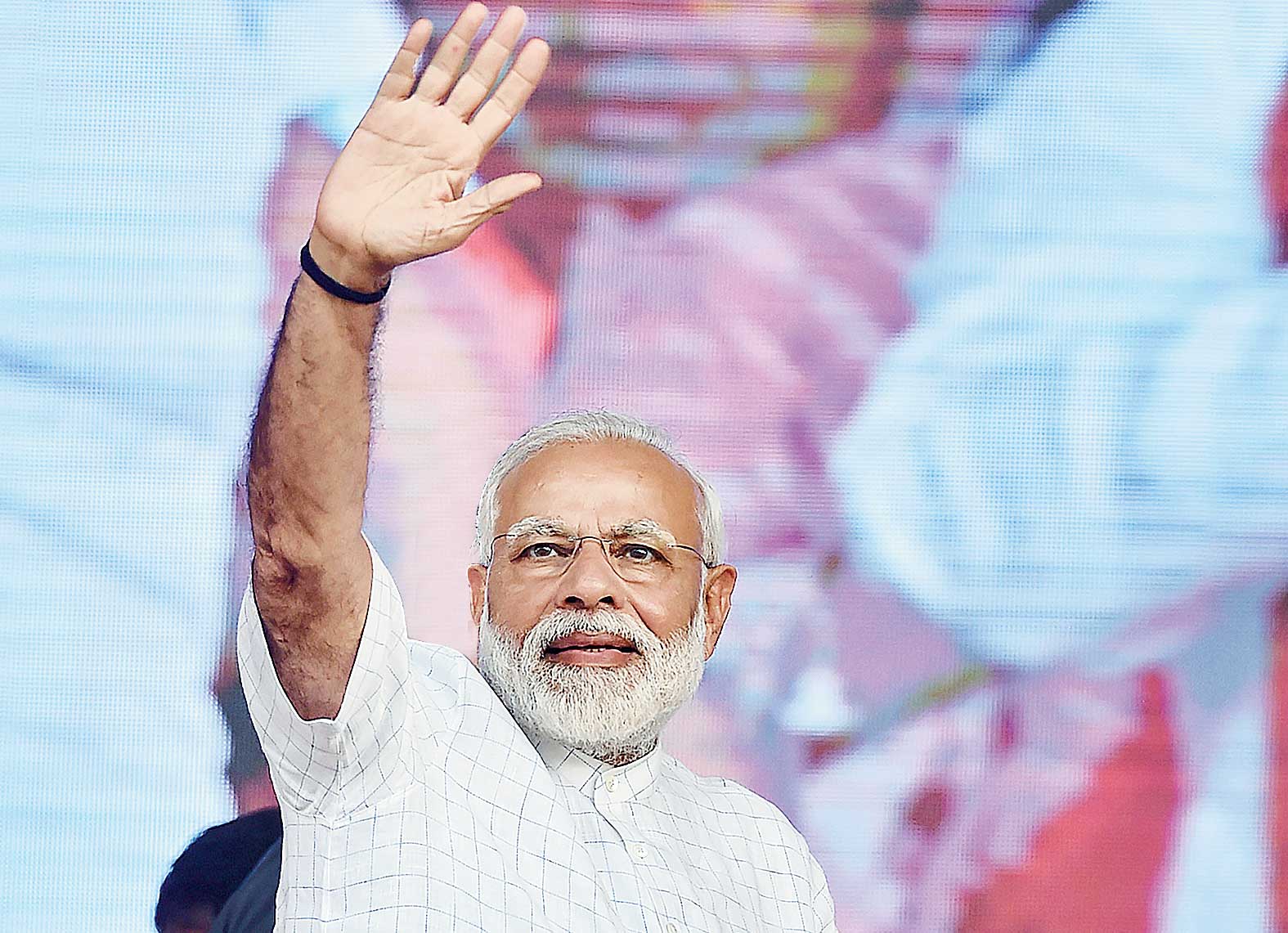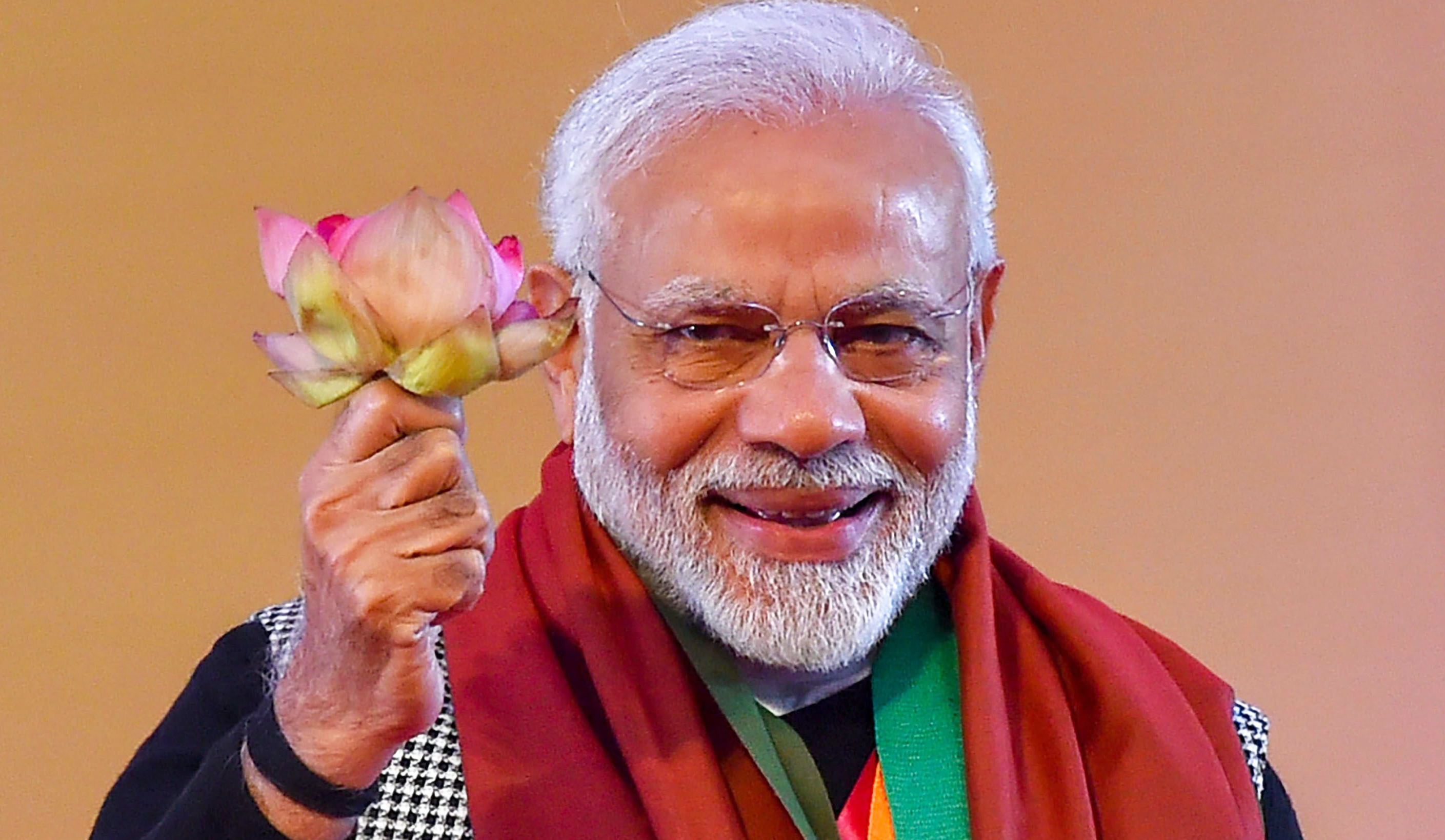Tonight, within minutes of the last vote being cast in the 17th elections to the Lok Sabha, India will be treated to a cloudburst. The findings of exit polls, 2019 will drench us.
‘Modi clear winner’, one or more than one poll will proclaim. ‘Modi again!’ — another. Not to be outdone, a third will whisper ‘Modi slips’. ‘Uncertainty looms,’ one channel will lament. ‘Hung Parliament likely,’ will brood another.
Echoing the prime minister’s own projection, the Bharatiya Janata Party’s spokesmen will declare, ‘We are going to win 300 seats.’ And the over-done ‘V’ sign popularized by Winston Churchill will be flashed. Using no sign but a metaphor borrowed from pharmacology, Opposition leaders will say, ‘Expiry date reached, pack up.’
But every such prediction will carry the very opposite of conviction. It will carry a hidden nervousness. The louder the assertion of victory, the more will it betray the vein of self-doubt, of uncertainty, that throbs within it, unseen. For the truth is, no one really knows, no one can know. No calculation, howsoever subtle or nuanced, can really say what the voters have resolved. The outcome lies within the sealed lips of the machine called the EVM.
If Narendra Modi is proved right and the National Democratic Alliance does win 300 seats, the Opposition will say in one voice that the EVMs have been hacked — a charge no one will be able to either prove or disprove. If the NDA beats the tally of the combined Opposition with a small margin, blame will be laid on the shoulders of Rahul Gandhi. If the combined Opposition surprises pollsters and actually gives us the miracle result of an NDA defeat, every doubt about the EVMs will vanish and Rahul Gandhi will be seen as the man of the match.
There is no doubt that he will win the Wayanad seat comfortably and, in all likelihood, Amethi as well. Winning both, I hope he retains Amethi and vacates Wayanad. Firstly, because winning from one’s father’s seat carries a voltage that is all its own. And because in this election, he has shown an amazing largeness of mind and heart in his response to the graceless comment that our prime minister made about Rajiv Gandhi. It is not just that the man being described in abusive words was assassinated 28 years ago but that the son was being ridiculed in the name of his parent — a gambit that would be considered shameful in any but the most shameless circles.
Did Rahul Gandhi need to contest from Wayanad? Did he really need to secure a second seat for himself at the cost of denting the democratic consolidation against supremacist majoritarianism? There is an old saying: one does not paint one’s own cabin when the ship is rocking on a stormy sea. I hope when he wins both the seats, he vacates Wayanad and backs a candidate in the consequential by-election on whom both the Left and the Congress can agree. That would, to an extent, heal the unnecessary wound that his candidature from Wayanad has created.
If there is one other seat about which the candidate can be absolutely sure, it is that of the prime minister, Narendra Modi. He is going to win his ‘personal’ seat in Varanasi by a spectacular margin. Why the Opposition could not, did not, put up a strong candidate against him is unclear. No one, that is, no one of political weight, was prepared to take him on, to walk into what was sure defeat. A great pity, for to fail before a Goliath of power, prestige, publicity, is no failure. I ardently wish Priyanka Gandhi had stood against Narendra Modi. She would have given him the toughest possible challenge and, beyond Varanasi, given the elections as a whole the one thing they have lacked: a national pivot. And she would have given us an invaluable example of decent, dignified speech, devoid of personal insinuations, insulting allusions and dramatics. And since Varanasi has been ‘reserved’ for the last phase of the seven phase poll, a NaMo-Priyanka contest would have been a grand finale, in which the ‘V’ sign would have paled before the dynamics of a fight valiantly fought for the principle of it. In the event, Narendra Modi can be taken to have won his seat and congratulations to him on that.
One candidate whose victory is not that assured but whose candidature has been in itself a triumph of sorts, is Kanhaiya Kumar. The flair — and frugality — with which he has fought to win in Begusarai with both the majors against him are exemplary.
The elections ending today have been the most competitive, the most divisive and the most verbally abusive in India’s history. They have set the worst imaginable precedents for India’s future in elections. The violence in West Bengal has been symptomatic of the stakes for the BJP. It has gone for the jugular in that state because it sensed the vacuum in the Opposition to the Trinamul Congress — an unhealthy situation in any democracy. But the stakes for a supremacist in a democracy are high even otherwise. And it is this that has made the elections sink to the levels that they have.
To my mind, most dismaying has been the attempt to ‘militarize’ the campaign by engulfing the defence forces’ gallantry in election rhetoric. Modi’s reference to our nuclear weapons capability as something that has not been acquired ‘for Diwali’, followed, a few days later by his description of how with his ‘raw wisdom’ he overruled expert reservations on conducting the Balakot air strike in unsuitable weather conditions, bespeak a bizarre mindset.
I have, in earlier columns in The Telegraph, spoken of the unique influence that a president of India can wield without in any way taking away from his ‘constitutional’ status. The restraining influence of the former president, K.R. Narayanan, on the government of the day, and the sense of rectitude of the former prime minister, Atal Bihari Vajpayee, made the elections that were called during the Kargil war the opposite of these elections: they set the healthiest possible precedent, namely, that our defence forces and our defence resources are to be left severely out of electoral politics.
Our esteemed Rashtrapatiji may have, as one in whom the supreme command of our defence forces vests, expressed in his one-to-one conversations with the prime minister his dismay with the prime minister’s bringing Balakot and bombs into his election speeches. Likewise, his co-optive references to the anti-satellite strike. If he has done that, so much the better for our republic. But if he has not, for any reason, done so yet, he can do so now, after the last phase of polling is over, but before the results are out, with no risk of ‘influencing’ the vote, in a public reflection. He can also reflect on the language used by candidates and their supporters, on the violence perpetrated. Between a president and the people there exists what may be called, borrowing a phrase from the world of banking, a mutual fund, a mutual fund of trust. That mutual fund declares a dividend whenever the president speaks his mind with no intent other than sharing his concerns. When those tally with the concerns of the people, the dividend is high in its returns.
We have done our bit, we have seen things said and done which are shameful. We have taken those into account and voted. We are human and are likely to have chosen erroneously. But now, it is over to you, esteemed Rashtrapatiji. We have you. And you have the Constitution.












